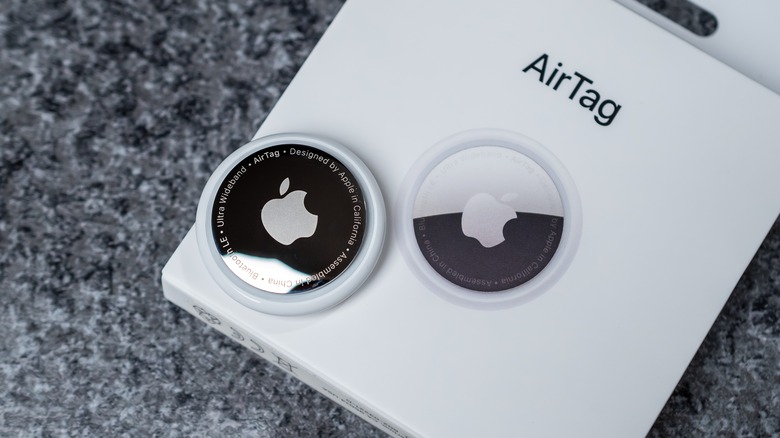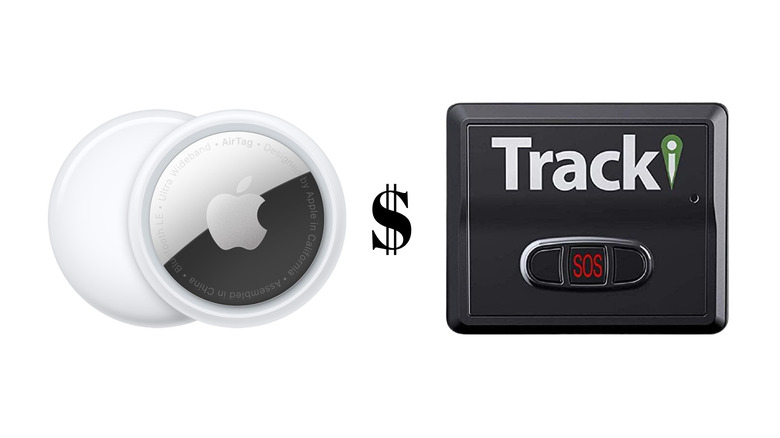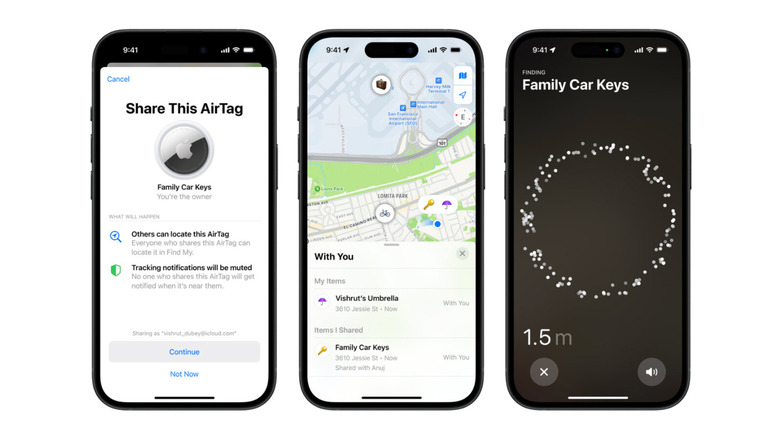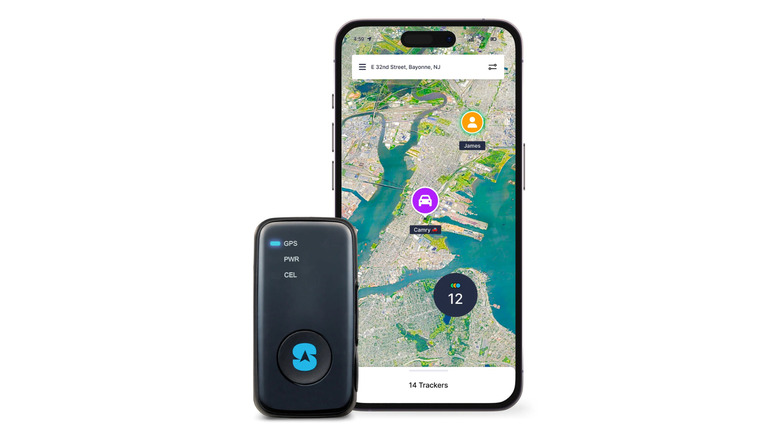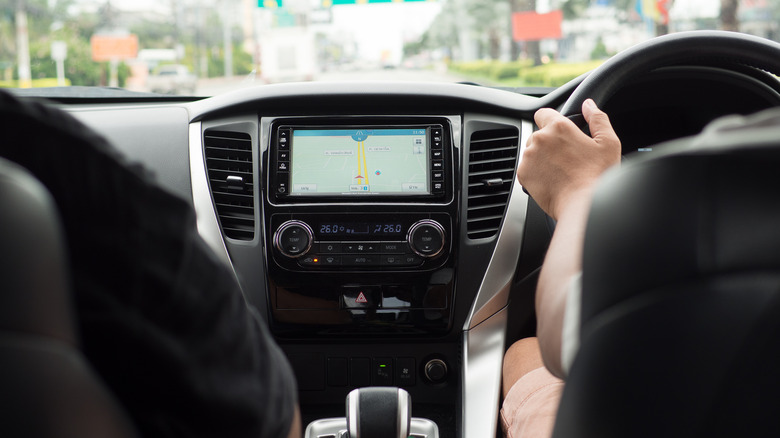Can AirTags Be Used To Track A Car? How It Stacks Up To A GPS Tracker
We may receive a commission on purchases made from links.
Released in 2021, AirTags are among the most popular tracking devices ever. They don't cost much, are easy to set up, and, most importantly, are deeply integrated into iOS, making them an easy choice for iPhone users. You can use AirTags to keep track of everyday items like keys, wallets, backpacks, luggage, and more. In fact, we've even included the device in our article about the 10 most groundbreaking product innovations by Apple. However, can you use AirTags to track the real-time location of a car?
Over the years, AirTag owners have found some really creative ways to use the device. People aren't just attaching an AirTag to their house's keychain or slipping one in their backpack; they're also using the tiny location tracker to ensure that their pets don't leave the house and wander in the neighborhood. Yes, there's a concerning side to how people have been misusing the devices to stalk others, but Apple and Google have put the required safety measures in place (more on that later). But does an AirTag stack up well against a GPS tracker? Let's find out.
To figure out the difference between an AirTag and a GPS tracker, we'll start with how much the devices cost, then talk about how they work, including the pros and cons of both. So, without any further ado, let's dive right into it.
AirTag and GPS tracker: How much do they cost?
Since its launch, AirTag has been available for $29 per unit, unless you're buying a pack of four, which costs $99. Although Apple hasn't discounted the price in the last three years, the device is often cheaper at third-party retailers. For instance, Walmart is letting an AirTag go for as low as $24.99, while the pack of four is available for $79.99, which is an even better deal. And it's not like you wouldn't find use for multiple AirTags.
For a few bucks, you can get keychain-like protective holders for the device and attach them to a bunch of keys, a zipper on your backpack, or even your pet's collar. While the holders could be an added expense, you'd also need to replace the batteries of your AirTag every year or so. The good news, however, is that it runs on replaceable CR2023 batteries, which are readily available and only cost two to three bucks.
In comparison, GPS trackers have a higher cost of ownership. To purchase one of the best GPS trackers for your car, you'd have to pay anywhere between $30 to a few hundred bucks. Further, you'd also have to pay a monthly subscription fee, which could range from $9 to $35 per month (or more), making GPS trackers relatively expensive. Based on the model you get, you'd also have to recharge the GPS tracker every now and then.
AirTag vs. GPS trackers: How do they function?
While both AirTags and GPS trackers can help you locate your car, the way they function (and the features they provide) are very different. AirTags, as the name suggests, are location-tagging devices that emit Bluetooth signals, which are picked up by a nearby Apple device (within Bluetooth range), such as an iPhone. Then, it is the iPhone that updates its location on the Find My network, which is sent to the AirTag's owner.
In other words, an AirTag is dependent on the nearby Apple device (with access to GPS) that transmits its location upon picking up the Bluetooth signals it broadcasts. As a result, the tagging device works exceptionally well in environments with plenty of Apple devices, like an office, a busy street, or a railway station. However, it struggles to provide a lead in secluded areas, such as a highway or a forest.
In contrast, GPS trackers can relay their location in real-time, which makes them more reliable for tracking vehicles, particularly recovering stolen cars. Unlike AirTags, GPS trackers work independently by leveraging high-accuracy GPS satellites to calculate their location and transmit it to users via cellular networks. Yes, you'd need to download and install a companion app that displays the real-time location on your smartphone or computer, but it gets the job done without much hassle.
GPS trackers provide several useful features over an AirTag
Apple's AirTag provides three different ways of locating a lost item. If the tracker is nearby, it relies on Precision Finding (using its Ultrawide Band chip) and Bluetooth to help you find it. You can also play a sound on AirTag's tiny speaker and then figure out where it is coming from. However, if the device is far (beyond Bluetooth range), it relies on Apple's Find My network to give you an idea of its last known location. The higher the density of Apple devices in the area, the higher the number of location updates you'll receive.
On the other hand, dedicated GPS trackers justify their higher upfront cost and monthly subscription by offering a host of features like frequent location updates, geofencing, route history, remote engine access, etc. The features you get depend on the model and the subscription tier you choose, but generally, additional features are available with the higher subscription tier. For instance, if you look at the Brickhouse 140-Day GPS Tracker, its base subscription ($17.99 per month) provides location updates every 60 seconds, whereas the top subscription tier ($34.99) increases the frequency to every five seconds. To sum up, AirTags don't stack up well against GPS trackers, especially when it comes to the additional safety features that the latter provides.
If you can afford one, get yourself a GPS tracker instead
Speaking of safety features, there's something that we'd want you to know about AirTags. Shortly after the device hit the market, cases of stalking started surfacing on the internet, where people would plant an AirTag in the handbag or backpack of the person they wanted to track. To curb such incidents, Apple rolled out unwanted tracking alerts for iOS users. Earlier this year, the company joined forces with Google to develop the Detecting Unwanted Locations Trackers (DULT) standard, wherein both iOS and Android users will receive a notification if an unknown Bluetooth tracking device (including AirTag) is moving with them.
While this safety feature is designed to limit the misuse of AirTags or other third-party Bluetooth trackers, it could act against the car owner in the event of a theft by informing the thief about the tracking device (and the ways to locate/disable it). Yes, the thieves could also find and disable a GPS tracker, but not unless they're deliberately looking for it. In conclusion, AirTags can be used to track a car, but not as effectively and accurately as a dedicated GPS tracker; they're better off as a personal belongings' tracker. If you still want to track your car, go for a dedicated tracking device instead. Feel free to check out our article on eight of the best GPS trackers for your car to get started with.
